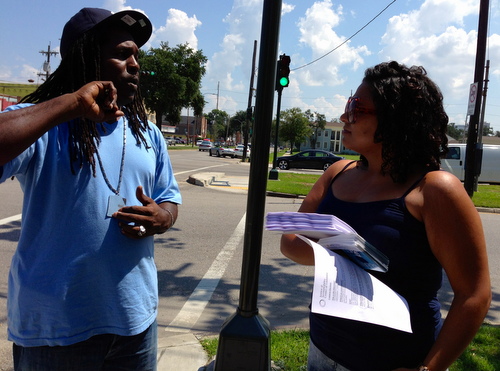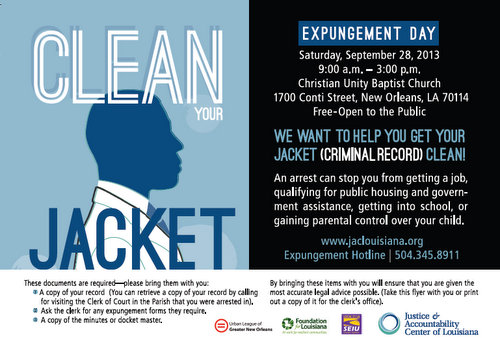
Robert “Kool Black” Horton and Ameca Reali. (photo by jewel bush for UptownMessenger.com)

jewel bush
Ameca Reali joins a small group at the corner of Orleans Avenue and North Galvez Street near the Lafitte Housing Development. Donning oversized shades, Reali recognizes that this particular day in September is a scorcher and immediately thanks the volunteers for braving the high temperatures, especially on a Friday afternoon.
After Reali leads a quick huddle, everyone takes off in separate directions to begin the task of distributing fliers for a unique community event she is organizing: an expungement fair.
In 2011, Reali and Adrienne K. Wheeler founded the Justice and Accountability Center, hoping to uncover where the criminal justice system is not working and try to make it better for those already tangled in its web. Today, the bulk of the new organization’s work is expungement.
Expungement is the process of having a conviction sealed or basically removed from your criminal record. Expungements are not to be confused with pardons. A pardon is essentially forgiveness whereas an expungement removes the conviction from your record like it never happened.
“An expungement can allow access to jobs and opportunity for thousands of Louisiana residents who face persistent unemployment and exclusion from social advancement after their encounter with the criminal justice system. Our goal at JAC is to get people out of the system and back to work,” says Reali, a graduate of Loyola College of Law.
“Rich and affluent people get expungements all the time because they have the money and the resources to navigate the system.”
Money and know-how are the biggest obstacles in the expungement process. There are fees to file the paperwork, attorney’s fees and various other court fees that can vary from parish to parish. This mounting bill and the complexities of the procedure oftentimes make expungement out of reach for people. The whole process can be tremendous and discouraging for the working poor who are struggling financially or those just overall shell-shocked following a round in the legal rodeo.
The expungement fair, Clean Jacket Day 2013, is scheduled from 9 a.m. to 3 p.m. Saturday, September 28 at Christian Unity Baptist Church located at 1700 Conti Street, New Orleans, 70114. There, free legal services will be provided to as many as 500 Louisiana residents who may qualify for expungement.
Fielding as many as 300 calls a day, the need for this work is clearly there. Managing the response for the expungement fair, modeled after a similar event held by a group of community activists back in 2008, has been a welcomed chore for JAC.
One in 86 adults are incarcerated or on probation or parole in Louisiana. The prison population in Louisiana is around 70 percent black. Meanwhile, Census data shows that only 48 percent of black men in New Orleans are employed — down from 63 percent in 1980.
“A large group of people in this city don’t know someone who has been arrested or don’t care, but they should. When we have members of our community who have once been incarcerated and are considered untouchable, we pay in many ways,” Reali explains. “If you keep people out of jobs, out of housing and disconnected from family and society, then there’s a cost for that. We will pay for social services providing those who can’t get work with food stamps and job placement for instance.”
Not above doing the legwork, which some would consider lowly, grunt work, Reali places flier after flier on doors in this 6th ward Treme neighborhood. When she’s able to catch someone outside or walking nearby, Reali takes the time to give a brief rundown of the event and to answer whatever cursory questions that may arise. Folks are in disbelief that something like this is happening and ask for another flier to pass the information along to a “friend.” Given the stigma attached to having a criminal record or being in the system, it is very well likely that the requested leaflet is actually for the person requesting it.
Leading up to the event, Reali and volunteers will be doing outreach, a strategy partly developed by Robert “Kool Black” Horton of Black Men United for Change and the People’s Institute, in Central City, the East and the Ninth Ward among other New Orleans neighborhoods.
“People who have been incarcerated want to work but they can’t find a job or if they do, that job’s not going to pay them enough,” Reali says. “They can go back out in the streets, but there are risks: going to jail or dying. If they don’t get what they need they are going to die anyway.”
Once upon a time, Reali was on the other side of the system as a scared sister working to help her mother navigate the criminal justice landmine when her teenage brother was arrested in her native, upstate New York, for a crime he didn’t commit. She saw how the experience impacted him and the entire family for that matter. Call it the goals of a naïve girl, but this incident shaped what is now the 30-year-old’s career, working to make sure what happened to her brother doesn’t happen to anyone else.
“We smothered my brother with love and unconditional support,” say Reali, who fought to have her brother’s record expunged. “My brother was in jail for 10 months, so imagine if you are in jail for three or four years and don’t have the support. People are isolated and Angola is so far.”
All Louisiana residents interested in attending Expungement Day 2013 must bring a copy of their record, expungement forms required by the Clerk of Court and a copy of the minutes or docket master. All documents must be retrieved prior to the event to facilitate attorney consultations. Individuals will be served on a first come, first served basis. For more information, call (504) 345-8911.
“JAC is not doing work that only a certain segment of the population should be concerned with,” Reali says. “This is really a community-wide health issue.”
jewel bush, a New Orleans native, is a writer whose work has appeared in The (Houma) Courier, The Washington Post, The Times-Picayune, New Orleans Homes & Lifestyles Magazine, and El Tiempo, a bilingual Spanish newspaper. In 2010, she founded MelaNated Writers Collective, a multi-genre group for writers of color in New Orleans dedicated to cultivating the literary, artistic and professional growth of emerging writers. She is currently communications coordinator for Service Employees International Union Local 21LA. Her three favorite books are Their Eyes Were Watching God, The Catcher in the Rye, and Are You There God? It’s Me, Margaret.

Why should an employer be denied the knowledge that a potential employee has a criminal past? The employer is responsible for the conduct of his employees and should have a right to full disclosure. It is their business being put at risk.
Why shouldn’t a marginal person without a criminal record be at a hiring advantage when in competition with a marginal person who has a criminal record? Shouldn’t good behavior and citizenship be rewarded?
The same people that can’t obtain jobs because of criminal records depend on the gov’t for living assistance<—your tax dollars at work. Why wouldn't you want them to be able to get a job. In addition to that, all criminal charges are not eligible for expungement.
I have no objection to employers hiring felons. But your logic is faulty, there are a limited number of jobs, a felon that takes a job leaves another marginal person unemployed. I simply believe we are responsible for our actions and employers have a right to make informed decisions. Why do you oppose openness and honesty?
Expungements are lies. If you were convicted a crime, you should not be allowed to answer falsely when asked if you were convicted of a crime. I think the process hurts black young men as it causes people to suspect that there are crimes not being revealed. A better social policy would be to encourage the employment of persons who have completed their sentences.
Expungement laws have been passed and they provide those that secure expungements with the opportunity to deny that they have been convicted/charged. The law has been passed 🙂
The law should be repealed.
The Louisiana House Speaker is Chuck Kleckley.
Expungment procedures are for every one, rich and affluent or poor and desitute. The circumstances become somewhat clouded and prohibitive for many defendants if there are multiple incidents spanning consecutive years.
I don’t oppose openness and honesty. I just believe in second chances. And are you saying that a criminal record should separates people into groups of “who can get a job” and “who cannot get a job?”